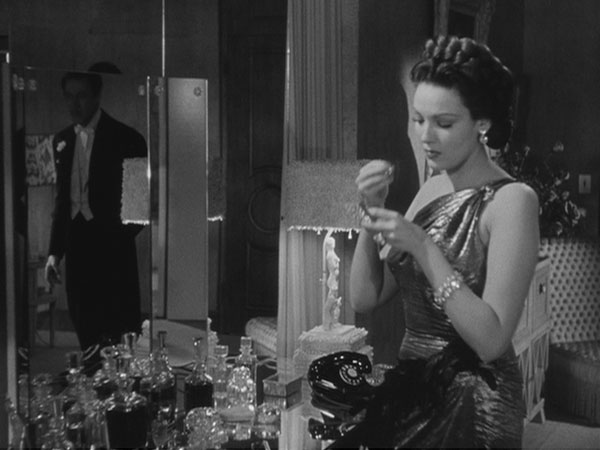Released the same month as Hail the Conquering Hero, Sturges at the top of his game with his regular comedy collaborators: Joel McCrea as the straight-man dentist, with appearances by Franklin Pangborn and Georgia Caine and Porter Hall, and yet another Betty co-lead – not Hutton or Grable but Field (of Renoir’s The Southerner). Twisting the concept of WC Fields as a big-nosed patient-hating dentist, McCrea empathizes with his patients and fights the establishment to advocate for painkillers in the form of ether. If that doesn’t sound like a madcap comic premise, well… it’s not… I’m sorry, this is just a dull historical drama. William “Muggsy” Demarest does liven up the movie in the second half, first as the doctor’s biggest failure (he has a bad reaction to the treatment and experiences an office-destroying war flashback then jumps out a second-floor window) then as his biggest advocate, following the doctor around and humorously/tediously proselytizing for ether treatment.
Betty gets mad after McCrea chased her dog with a bottle of ether:

So, what happened here?
Alessandro Pirolini in The Cinema of Preston Sturges:
Triumph Over Pain, Sturges’s original script for a movie that was re-edited and released by Paramount as The Great Moment. In the script (and in the original cut), Sturges had created a complex non-chronological flashback structure that shifted back and forth between flashback and framing story, with Lizzie Morton and Eben Frost taking turns both as narrator and narratee
Pirolini compares the original script to Terence Davies: “with the ultimate goal of portraying the act of remembering, instead of the events remembered … the studio’s re-editing was mainly intended to ‘correct’ the non-chronological order of flashbacks, in order to normalize the narrative structure.”
A normal patient in the pre-ether days:

James Curtis in Between Flops says the studio-proposed title was Great Without Glory, and the movie was butchered by Buddy DeSylva, a songwriter turned producer, who’d written “Button Up Your Overcoat” and co-founded Capitol Records. Curtis quotes Sturges: “My next picture is coming out in its present form over my dead body. The decision to cut this picture for comedy and leave out the bitter side was the beginning of my rupture with Paramount. They did the same thing to Hail the Conquering Hero, but through a last-minute maneuver I was able to get the picture back into shape. I was unable to do so in the case of The Great Moment. The dignity, the mood, the important parts of the picture are in the ash can.”
Muggsy fainting in the operating theater:

How is this helpful?

Stuart Klawans in Crooked but Never Common:
In 1938, amid a small wave of enthusiasm in Hollywood for tales of crusading scientists — The Story of Louis Pasteur (1936), Dr. Ehrlich’s Magic Bullet (1940) — Paramount bought the rights to a history of surgical anesthesia, Triumph Over Pain, by René Fülöp-Miller, and hired [Samuel] Hoffenstein to work up a biopic … Sturges kept it alive … and asked to take over from Hoffenstein as screenwriter … By the time Sturges had [The Palm Beach Story] in the can, the script for Triumph Over Pain had lain in his drawer for more than two years. He might easily have left it to die of suffocation. Instead, he lobbied Paramount to green-light Triumph Over Pain and began revising the script again in February 1942.
…
By late April 1943 the [recut] picture, now retitled The Great Moment, was ready for release.
But it wasn’t released. Neither was The Miracle of Morgan’s Creek. Paramount held them both back while Sturges finished shooting Hail the Conquering Hero. Mixed responses to the previews of the latter film, in late 1943, prompted DeSylva to subject it to a fate similar to that of Triumph Over Pain … When Paramount at last released The Miracle of Morgan’s Creek, in January 1944, it immediately vindicated Sturges, becoming his greatest box-office hit. The next month brought further vindication: Paramount previewed DeSylva’s reedited Hail the Conquering Hero to a dismal response. When Sturges offered to return to Paramount to fix the picture, without salary, the studio could only say yes. But when Sturges subsequently appealed to DeSylva’s boss, Y. Frank Freeman, to let him do the same for Triumph Over Pain, the answer was a flat no.





